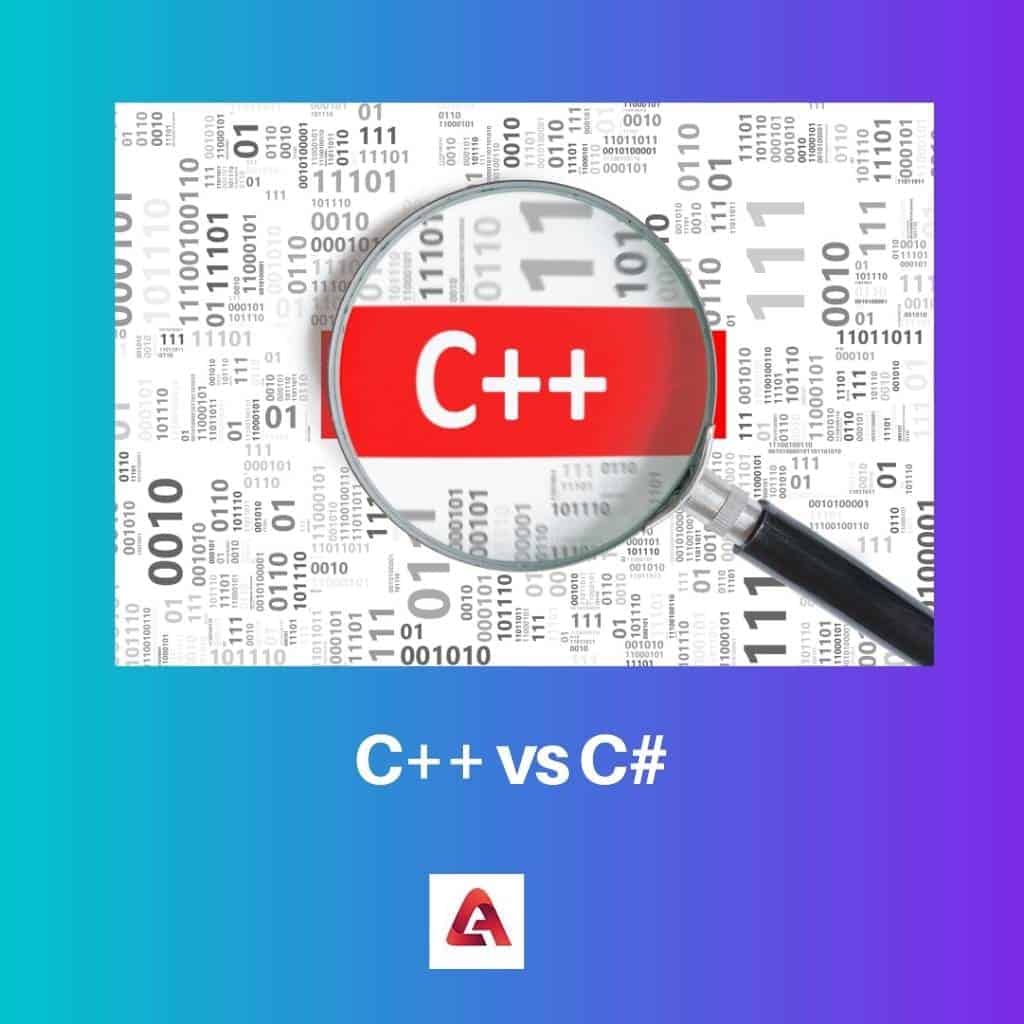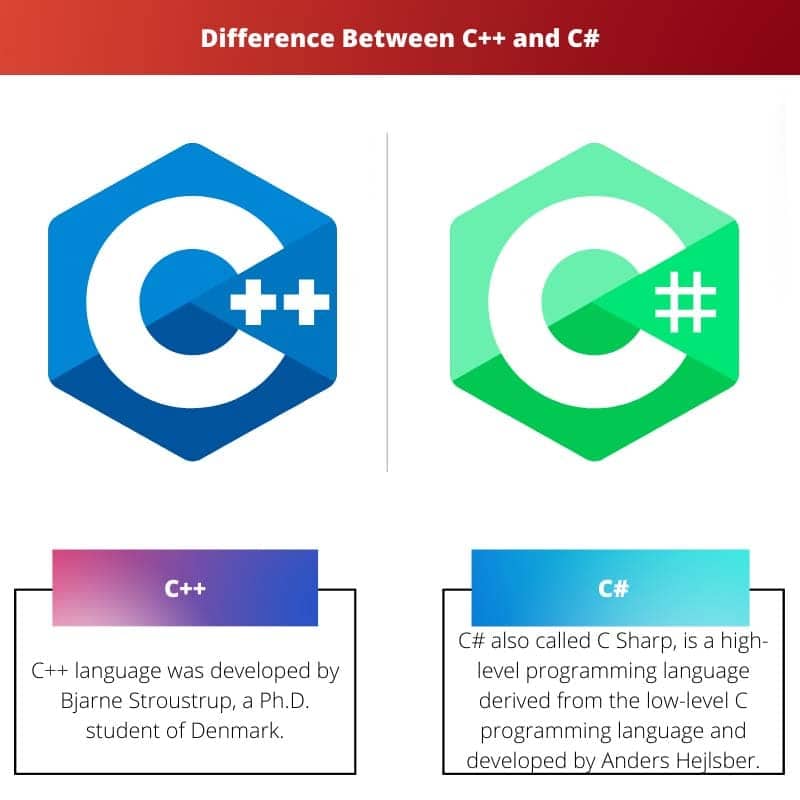The computer is used in almost all of the activities taking place. To make computer changes and innovations, a person needs to be a programmer; to understand and write the computer language.
Programming is a course under which a person learns one or several computer languages. The choice is yours which language you want to learn.
There are various computer languages, such as Java, C#, C+, python, etc. C++ and C# are the most common and important computer languages and are the extension of the C language.
Most people get confused between those and find it difficult to choose between both languages. To terminate this, this article has all the differences between C++ and C# so that it’ll be easier for everyone to choose the best language for them.
Key Takeaways
- C is a procedural programming language, while C++ is an extension of C that supports object-oriented programming.
- C++ provides features like classes, objects, and inheritance, which are absent in C.
- C++ allows for more code reusability and easier maintenance than C.
C++ vs C#
C++ is not perfectly object-oriented, while C# is Object programming. They also have a difference in terms of their features, such as memory management, platform Dependency, Multiple Inheritance, Bound Checking, Pointer, compilation, application, and many more.

C++ is a middle-level programming language and is an extended version of a low-level C programming language that has additional features.
It has several advantages that include portability or platform independence, multi-paradigm, memory management, low-level manipulation, large community support, scalability, and, last but not least, compatibility with the C programming language.
C# is also a programming language and is an extended version of the C programming language that runs on the .Net framework. It is also an enhanced version of the C++ programming language.
It has several advantages that include object-oriented, cross-platform, automatic garbage collection, avoiding the problem of memory leak, better integration, cost-benefit, programming support, etc.
Comparison Table
| Parameters of Comparison | C++ | C# |
|---|---|---|
| Memory Management | It is performed manually. | It is performed automatically. |
| Platform Dependency | Code can be run on any platform. | Code is windows specific. |
| Multiple Inheritance | It supports multiple inheritances. | Do not spend multiple inheritances. |
| Bound Checking | Not performed by the computer. | Performed by compiler |
| Pointers | Can be used anywhere in programs. | Can only be used in unsafe mode only. |
What is C++?
C++ language was developed by Bjarne Stroustrup, a PhD student in Denmark, to improve the existing C programming language by adding some new features.
It is an intermediate-level programming language due to its derivation from a low-level language. All technical and commercial software can be developed with these programming languages.
Following are some facts about the C++ language:
- It introduces object-oriented programming from the Simula67 Programming language.
- It supports primary features such as abstraction, polymorphism, encapsulation, and inheritance of object-oriented programming.
- The minimum requirement to run a C++ program is a function.
- It was invented at American Telephone & Telegraph, bell laboratories in the U.S.A.
- It can also be written without using classes.
- Most of the new languages are influenced by it.
- It supports several programming styles.
Although this has various advantages, as mentioned above, it still has all the following disadvantages:
- It is an 8-bit program only.
- During high-level programming, it becomes more complex.
- It does not support garbage pickup, Dynamic Memory Allocation, or built-in threads.
- It is not fully secured due to its pointer and global variable.
- It is not used for the platform-dependent app.

What is C#?
C#, also called C Sharp, is a high-level programming language derived from the low-level C programming language and developed by Anders Hejlsberg, a leader of a team at Microsoft, in 2002.
It compiles into byte code. Following are some of the facts related to C# are:
- The name is stimulated by musical notation.
- The name C# was first used in 1988 by the Microsoft team.
- It is similar to other C-style family languages, for example, Java and C++.
- It is used for embedded systems to write the application.
- It is suitable for developing games, web pages, android applications, Windows store apps, etc.
- Contains the highest class that supports Generics Templates and internalization.
- It has a native garbage collection.
- Offers Standard Library
- Assembly Versioning
- Conditional Compilation
- Simple Multithreading
- Lambda and LINQ Expressions
- Integration with Windows
Disadvantages of C# programming languages:
- It has a poor X-platform GUI.
- The server running the application of the system must be Windows based.
- It is less flexible as compared to other languages.

Main Differences Between C++ and C#
- They both are different in terms of memory management. In C++, it is performed by the programmer manually. He is responsible for deleting the object he earlier created for some task, while in C#, this is done by the garbage collector automatically. The garbage collector is responsible for deleting the object created by the programmer for some task.
- C++ has an advantage as it can be used on any platform, while C# can only be used on Windows.
- Multiple Inheritances are supported by C++ but not by the C#.
- Bound Checking by the compiler is not supported in C++, while in C#, bound checking is performed by a compiler.
- The programmer can use the pointer anywhere in C++, while it can only be used in an unsafe mode in C#.
- As both of them are extended versions of a low-level programming language, but C++ is a middle-level, and C# is a high-level programming language.
- C++ is comparatively difficult and more complex to use, whereas C# is easier due to its well-defined hierarchy classes.
- After compilation, C++ code directly converts into machine code while C# code converts into an intermediate language.
- C++, due to its primary data types, is not purely object-oriented programming, while C# is purely Object-oriented programming.

- https://books.google.com/books?hl=en&lr=&id=9DEJKhasp7gC&oi=fnd&pg=PR3&dq=what+is+C%2B%2B&ots=_cYdM8CqQB&sig=NmGZEoyIF–mk4t60KuDzZgREYY
- https://dl.acm.org/doi/abs/10.1145/1379022.1375591
- https://dl.acm.org/doi/abs/10.1145/1018203.1018205

This comprehensive article provides all the necessary information for someone trying to understand the differences between C++ and C#. Well done.
Yes, it’s great to finally have a clear comparison between C++ and C#.
I couldn’t agree more, Eturner. The article addresses all the important aspects of both languages.
I appreciate the detailed comparison, it’s very helpful for someone like me who is new to programming. Great article.
Absolutely, Linda. This article provides a comprehensive overview of both languages.
The article provides a clear understanding of the differences between C++ and C#. Very helpful for someone looking to choose the right programming language.
I agree, Sean. The comparison table was especially useful for me.
Absolutely, Sean. Choosing the right language is crucial, and this article helps to make an informed decision.
I appreciate the breakdown of the advantages and disadvantages of both C++ and C#. It’s important to weigh all the factors when choosing a programming language.
Definitely, it’s crucial to have all the necessary information before committing to learning a new language.
The comparison table was very useful in understanding the differences between the two languages. A fantastic resource for anyone looking to learn C++ or C#.
Absolutely, Carmen. This article is a great starting point for anyone considering either language.
I found the breakdown of advantages and disadvantages particularly helpful in making an informed choice.
I’ve always been curious about the differences between C++ and C#. This article has provided a clear and thorough explanation.
Yes, it’s great to see a comprehensive comparison laid out so clearly.
Agreed, Beth. The comparison table was particularly helpful.
The detailed comparison between C++ and C# is excellent. Well-structured and informative article.
Completely agree, Jade. This article has provided a clear understanding of both languages.
I appreciate the detailed explanation of C++ and C# features. It’s very informative and helpful for those deciding which language to learn.
I found the comparison between the advantages and disadvantages of both languages particularly insightful.
Definitely, Helena. The thorough comparison makes it much easier to understand.
The breakdown of features and differences between C++ and C# is extremely informative. Thank you for this detailed article.
This article is a great resource for anyone trying to understand the differences between C++ and C#.
I found the explanations of memory management and platform dependency particularly enlightening.
Thanks for this comprehensive comparison! It’s really helpful to know all the differences between C++ and C#.
I agree! This was a very informative article!